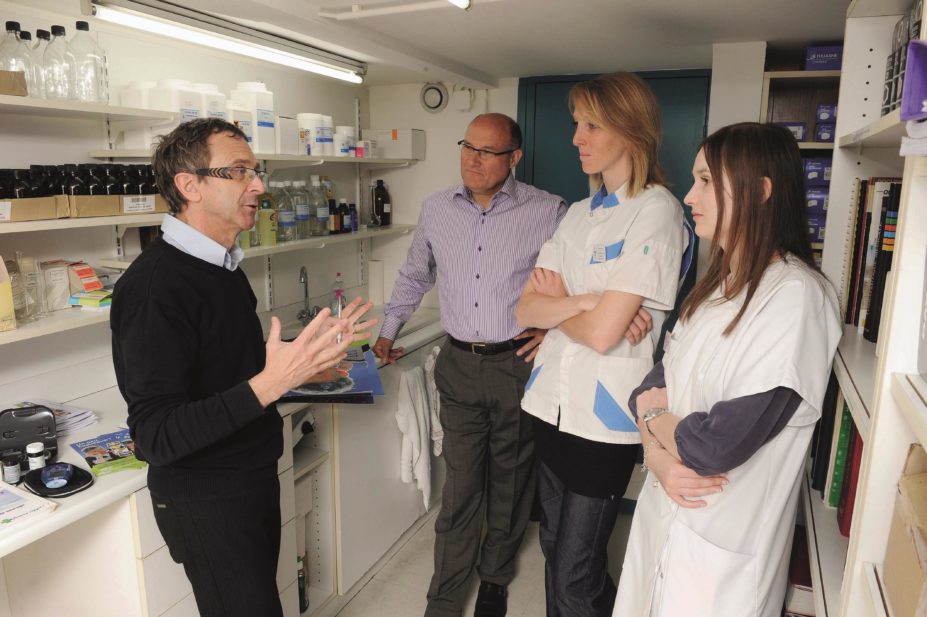
BSIP SA / Alamy
Many pharmacists in a variety of sectors have to take on some management responsibilities, even if their job title does not explicitly state “manager”. Pharmacists regularly have to interact with other members of staff, including counter assistants, pharmacy technicians and other healthcare professionals, and often have to delegate tasks or offer support.
Locums and newly registered pharmacists in particular may struggle with management responsibilities. Delegating tasks to other members of staff at different levels of seniority may present a challenge but it is an important skill to master, especially if pharmacists are called upon to boost the delivery of clinical services or introduce a new service.
Tip 1: Support junior colleagues
All employees will encounter daily problems as they perform their work. A good manager will help junior staff to solve problems, for example, by securing extra resources where possible. Additionally, he or she will also support staff to help themselves, by giving them the time and resources to grow into a new role. Junior staff may also need to be directed to these resources and, if they do not use them, they may need to be reminded that their managers cannot or will not be available to sort out every challenge. A good boss does not allow him or herself to become the ‘nanny’ — instead, staff should be empowered to manage and lead themselves, according to Catherine Duggan, director of professional development and support at the Royal Pharmaceutical Society.
Inspiring through trust
Will Farmer, now of Exminster Pharmacy in Exeter, was awarded the title of Numark pre-registration pharmacist of the year in 2011 for a ‘Bits and bobs’ campaign, which raised awareness of self-examination for testicular and breast cancer among young men and women aged 18–30 years.
To achieve the aims of his campaign, Farmer had to involve other pharmacists and healthcare professionals, as well as have the confidence to speak on local radio stations, despite still being a trainee. “A good manager learns to discuss ideas before they start and encourages the key stakeholders to have their say and feed back,” he says. “It is a good idea to be respectful of people already in-situ but you also have to have confidence in your own opinion, even if you are very new. The trick is to be respectful and to inspire through trust rather than control.”
Farmer says he found it helpful to reflect on and evaluate his ideas. “If it turns out to be stupid idea you can learn from that,” he adds.
In early 2013, Guy’s and St Thomas’ Hospital decided to repatriate immunosuppressant prescribing for renal transplant patients (from NHS England, which assumed this responsibility in April 2013) as a way to improve patient care and achieve cost savings through measures such as switching to generic prescribing. Lucy Galloway, now the lead pharmacist for renal, transplant and urology at Bart’s Health NHS Trust, says the project she led was initially met with resistance from all parties — including consultants, clerical staff and patients — but that by taking the time to communicate the vision for the project and acknowledge concerns, all parties came together to help drive the change forward. “Management alone may be enough to deliver operational targets, but it won’t be able to respond to changing needs of patients and staff,” she says. “As healthcare professionals, we need to drive change that improves the quality of care, and this needs to be a shared vision.”
Tip 2: Improving things is not someone else’s job
It is everyone’s job to improve patient care – not just the manager’s. Any staff member can share a good idea. Having enthusiasm, positivity and a can-do attitude is a good way to inspire others to get involved. Understanding the challenges of other people’s roles can help ensure that your ideas come across as realistic and practical, says Galloway.
Challenging perceptions
Jo Kember, who is now a locum following a long career as a branch manager, says incoming pharmacists should take some time to assess each new pharmacy to find out what its needs are and to be prepared to add value when required. To do this effectively, individuals should not have preconceptions about the practice — “No two pharmacies are the same,” Kember remarks.
In her experience, in some practices the pharmacist will be there for their pharmacy expertise but in others the pharmacist is needed to lead. “There will be different attitudes and team abilities in each and, if you misunderstand the pharmacy’s agenda or culture, the danger is that you just become a square peg in a round hole,” she explains.
The need to meet targets may also prevent staff from focusing on the wider clinical reasons for services such as medicines use reviews or the new medicines service, to give examples from community pharmacy. Link-selling in retail can be seen simply as a way to increase customer spend but, in fact, it may be a timely prompt to buy a forgotten, needed item. According to Robbie Turner, chief executive officer of Community Pharmacy West Yorkshire, the key is to reframe the discussion inside a context of patient care, rather than commercial gain.
Tip 3: Don’t be bossy
Managers should see their staff as business partners who can help them accomplish management goals. They should consider suggestions and complaints from staff, and have empathy with those who are struggling, says Kember.
Re-engaging the team
Following an organisational reconfiguration several years ago, the pharmacy service at West Herts Hospitals NHS Trust was struggling to provide efficient, joined-up services across its new three-site structure. The service appeared fragmented and the team was demoralised and tired.
The task of reviving and reconnecting the team to improve services and achieve a better experience for staff and patients fell to chief pharmacist Martin Keble. One of the first things he did to tackle the problem was to invite staff to take part in an open ‘tell it as it is’ discussion. There, staff could share their feelings — they were frustrated and felt undervalued, disconnected and isolated.
Keble took staff feedback on board and ensured that, where possible, additional investment in resources was secured. Time was also taken to help the staff members understand the trust’s ‘vision’ for pharmacy services over the following three years and their role within that vision. Keble believes that communication is vital in bringing staff along with you. “I have learnt that you can never discuss the change with staff too much,” he says. Keble recommends involving staff from an early stage, getting input from a variety of sources and using language that staff understand. “Junior staff may switch off if given a 20-page document including the word ‘framework’,” he says. “My experience is that pharmacy staff like to know the context of the change that is being managed.”
Overall, the effort has been worth it: the new dispensing robot now realises maximum return on investment; medicines reconciliation within 24 hours is up to 91% (from 64% in 2010) and pharmacy waiting times have halved. Importantly, staff have regrouped and are themselves leading improvement initiatives, buoyed by better working relationships. Staff are more satisfied and the pharmacy department enjoys a much higher and more positive profile in the trust. Summarising the experience, Keble says: “It has been a long journey that has required a willingness to transform.”
Tip 4: Give credit for a job well done
People like to feel valued and acknowledged for their contribution. Turner emphasises that, irrespective of your managerial status, you will achieve more support from your colleagues if you willingly recognise good performance, readily say ‘well done’, and often publicly credit your colleagues’ work.


